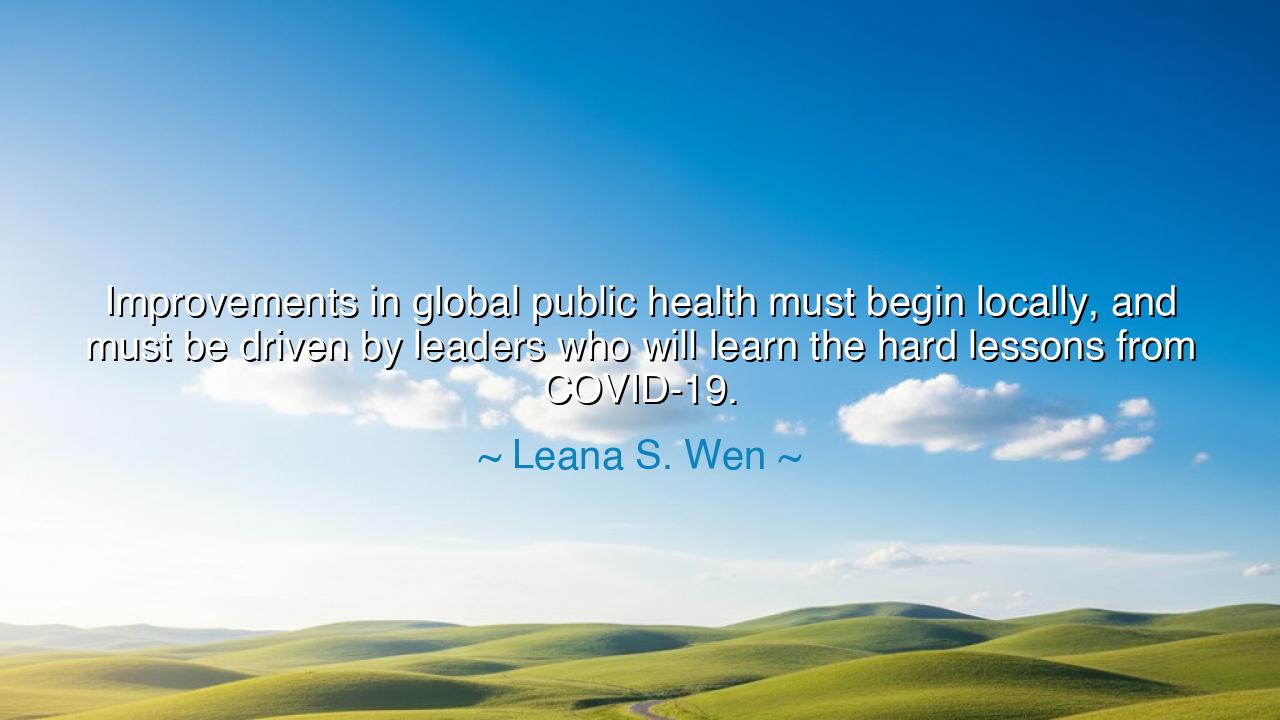
Improvements in global public health must begin locally, and must
Improvements in global public health must begin locally, and must be driven by leaders who will learn the hard lessons from COVID-19.






“Improvements in global public health must begin locally, and must be driven by leaders who will learn the hard lessons from COVID-19.” Thus spoke Leana S. Wen, a physician and public health advocate whose voice carries the tempered wisdom of one who has walked through the storm and seen its scars upon the world. Her words are both a remembrance and a prophecy — a remembrance of the suffering that shook humanity during the great pandemic, and a prophecy of what must be done if civilization is to emerge wiser rather than merely weary. In this single sentence, she distills a truth as ancient as it is urgent: that healing the world begins in the smallest circles, and that leadership, to be righteous, must be forged in humility and in pain.
The meaning of this quote reaches beyond medicine; it speaks to the very architecture of progress itself. Global public health, the safeguard of nations, cannot be sustained by distant proclamations or lofty treaties alone. It begins with the local, with the village clinic, the community worker, the neighbor who tends to another’s fever. The great systems of care are only as strong as their smallest foundations. Just as a temple cannot stand if its stones are weak, so too the health of the world cannot endure if local communities are neglected. Wen calls upon leaders to remember this — that compassion, coordination, and courage must start where life begins: in the home, in the city, in the soil of the people.
Her call is also a plea for wisdom born of hardship. The COVID-19 pandemic, which swept through every land and household, revealed the fragility of human institutions and the arrogance of unpreparedness. It was a mirror held up to the world — showing that no nation, however powerful, is immune from the failings of pride and disunity. Wen’s words remind us that suffering is not meaningless if it becomes the seed of wisdom. The “hard lessons” of COVID-19 — the value of transparency, the necessity of trust, the strength of science joined with compassion — must not be forgotten. For the fool repeats the pain he refuses to learn from, but the wise turn their wounds into the foundation of resilience.
Consider the example of Florence Nightingale, the “Lady with the Lamp,” who walked among the dying soldiers of the Crimean War. In her time, disease killed more soldiers than bullets, and neglect was as deadly as any weapon. She saw that no decree from generals could save the wounded if the hospitals themselves were unclean, if leadership lacked understanding. So she began locally — by washing floors, improving sanitation, counting the dead. Her humble acts of reform rippled outward, reshaping global medicine itself. From her lesson, we learn the eternal truth Wen echoes: that great revolutions of health begin in the simplest acts of care.
Leana Wen’s insight also reminds us of the moral duty of leadership. True leaders are not those who wield authority from afar, but those who stand among their people in times of trial — who listen, adapt, and change. The “hard lessons” she speaks of are not only logistical but spiritual: the humility to admit error, the courage to act early, and the compassion to value every life equally. The pandemic exposed leaders who faltered because they governed with ego rather than empathy. Wen’s call, therefore, is a summons to a new kind of leadership — one that measures success not in wealth or pride, but in the health and dignity of its people.
In her words, there is also a quiet reverence for interconnectedness. No village, no city, no nation stands alone. The disease that begins in one market can reach every shore; the cure that arises in one laboratory can save the world. Thus, to heal globally, we must build locally — creating systems that are just, accessible, and wise. The village nurse is as important as the global minister; the sanitation worker as vital as the surgeon. Wen reminds us that unity is not a dream of philosophers but the very strategy of survival.
Therefore, O listener and seeker of wisdom, take heed: learn from the suffering you have seen. Do not let the memory of pain fade into complacency. Strengthen the weak places around you — the clinics, the schools, the hearts of your neighbors. Support leaders who act with humility, not hubris. Be yourself a guardian of health, a vessel of care, even in small ways. For when each community stands strong, the whole earth is fortified.
And so, the lesson of Leana S. Wen endures: that health, like peace, begins with one person choosing to care, and that from such choices, nations are redeemed. Let the world not waste its suffering, but transform it into wisdom. For in the wake of every plague, there lies the chance to build anew — stronger, kinder, and forever reminded that the health of humanity is one shared breath.






AAdministratorAdministrator
Welcome, honored guests. Please leave a comment, we will respond soon